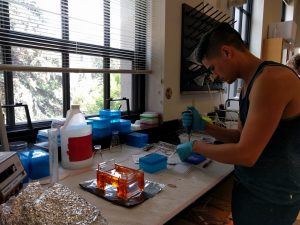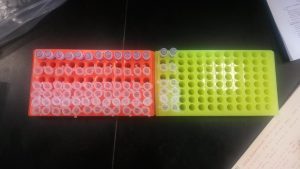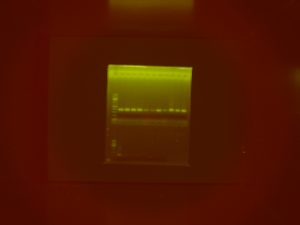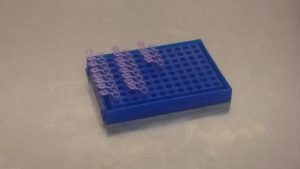June 26th, 2016
 This week I extracted DNA from PMA treated soil solutions, ran two rounds of PCR for the PMA treated soil DNA and two rounds of gel electrophoresis, trained on using Unix and RStudio software, and trained on processing sequencing data. In the communication workshop I learned how to write and include the methods section of a scientific paper on a poster, I learned about ethics within a research setting, tips for working in a research group, and how to put together an effective presentation, and how to give an engaging presentation.
This week I extracted DNA from PMA treated soil solutions, ran two rounds of PCR for the PMA treated soil DNA and two rounds of gel electrophoresis, trained on using Unix and RStudio software, and trained on processing sequencing data. In the communication workshop I learned how to write and include the methods section of a scientific paper on a poster, I learned about ethics within a research setting, tips for working in a research group, and how to put together an effective presentation, and how to give an engaging presentation.
This week definitely presented quite a few challenges. The biggest challenge I’ve had to overcome is learning how to use the Unix operating system on a Mac computer. My experience with using Macs is very limited and I’ve never had to use an operating system like Unix. Learning the specific commands to input into the terminal window is far different than simply just clicking on icons or right-clicking an icon for functional options. It is definitely frustrating because I don’t understand how to format a lot of the complicated commands that are necessary to process DNA sequencing data. Thankfully, my mentors provided me with a tutorial  that goes over all of the necessary commands and what’s happening at each step to the data set but initially Tess had me go through the tutorial by myself. I was completely lost and often received error messages and couldn’t determine what I was doing wrong. After a while, Tess came over to my desk and walked me through the whole process and I realized that I really did need to be guided through it. I’m a little nervous about what will happen when I need to work through the substantial amount of sequencing data that I’ll get from my own experiment, but I’m certainly not going to be hard on myself for not understanding it immediately.
that goes over all of the necessary commands and what’s happening at each step to the data set but initially Tess had me go through the tutorial by myself. I was completely lost and often received error messages and couldn’t determine what I was doing wrong. After a while, Tess came over to my desk and walked me through the whole process and I realized that I really did need to be guided through it. I’m a little nervous about what will happen when I need to work through the substantial amount of sequencing data that I’ll get from my own experiment, but I’m certainly not going to be hard on myself for not understanding it immediately.
Another challenge I dealt with this week was having to carefully prepare the DNA for PCR. Tess warned me of the dangers of contaminating primers, because other lab technicians use the same primer solutions for their own data. If I didn’t correctly implement sterile technique, I could ruin every successive data set that followed as a result of others using the contaminated solutions. She told me to notify her or Jessica immediately if I might think I contaminated the solutions. The first round of PCR, I was supervised by Tess and felt relatively confident about my results. When I performed the second  round of PCR myself, I definitely was extra careful and focused a lot on my sterile technique. I think I’ll become more confident in this process the more I do it.
round of PCR myself, I definitely was extra careful and focused a lot on my sterile technique. I think I’ll become more confident in this process the more I do it.
I learned this week that being a researcher can be quite humbling. There were moments where I felt really confident in my abilities to execute the laboratory techniques that I had been working on the past several weeks, but even though I felt that I had a handle on the process, I still found myself making mistakes. I’m reminding myself that it takes time to catch on to something that I’ve never done before. I’m also determining that there are aspects of this job that I have strengths in and other aspects that I am very limited in my knowledge in. I feel that there will always be days that I feel a little lost, but I know that I shouldn’t be ashamed to ask for help. Being a researcher is not a job for one person. It’s nice to be in a team where everyone can bring their personal strengths to the table.
I’ve made a few observations regarding how my perception of lab work and research has shifted since the beginning of this internship. Before I started working in the lab, I envisioned that going to work for this internship would be a lot like attending a lengthy lab course. In some ways it is similar – there’s an overall objective for each shift and it’s important to keep a record of everything you’re doing for reference later – but I wasn’t expecting to see that a significant portion of the day (mostly for the other researchers working in the lab, rather than for myself) is spent writing. I always see the other researchers on their computers working on  writing papers for their experiments. It takes up a substantial amount of their time! It does intimidate me a little, but I still feel like I could adjust to it if I ever got the privilege to work as researcher full-time. It does seem to break up the monotony of simply doing lab work all day.
writing papers for their experiments. It takes up a substantial amount of their time! It does intimidate me a little, but I still feel like I could adjust to it if I ever got the privilege to work as researcher full-time. It does seem to break up the monotony of simply doing lab work all day.
In terms of my research project, I feel much more confident in the subject matter and objective of the project. In the beginning, the subject of my project felt vague and somewhat up in the air. Now I feel as though I have a definite set of data that I’m looking to obtain. I’m looking forward to seeing the results!!
Next week is going to be quite busy for me. It’s unreal to me that on Wednesday of this week, I will have successfully made it to the middle of this internship. Time is flying by!!

You certainly are learning lots of different aspects of research Scott-Wesley! I wonder if even Unix will become more user-friendly.